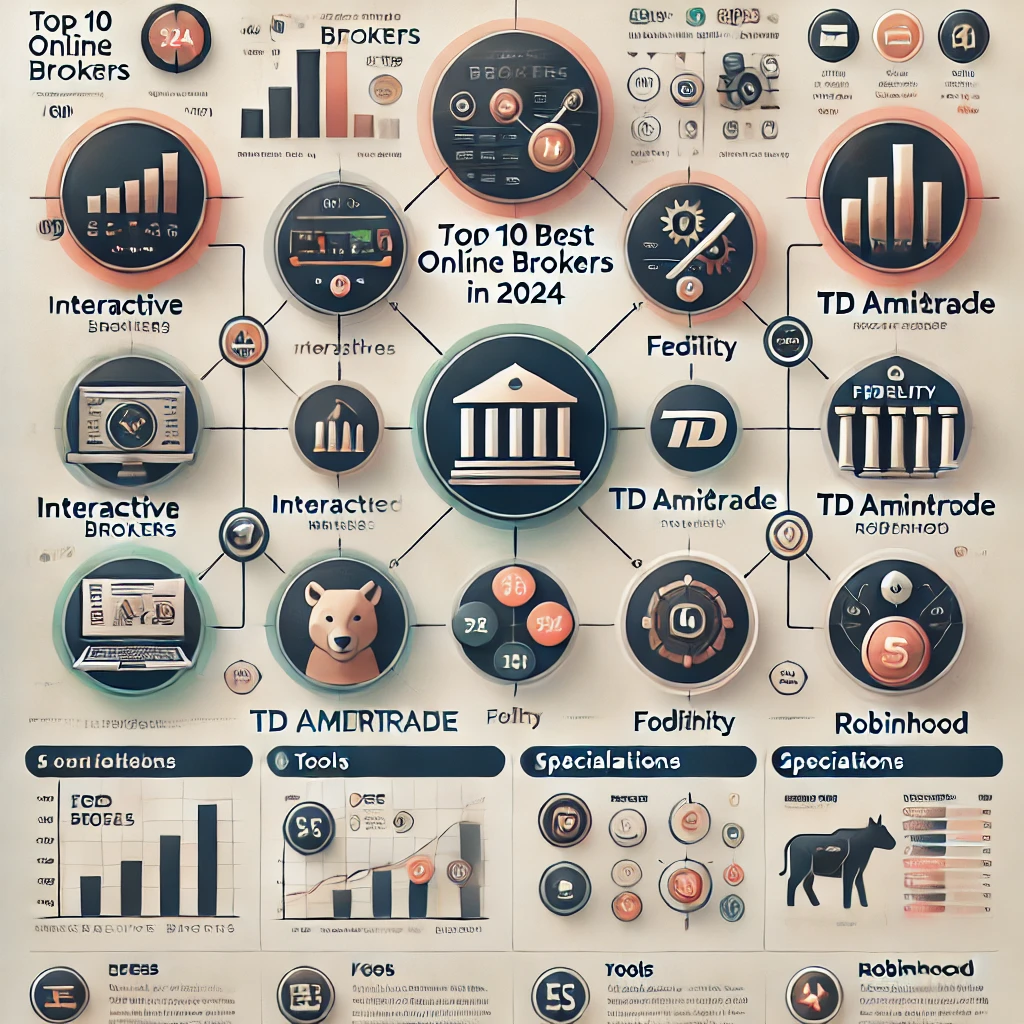Best Online Brokers: A Comprehensive Guide for 2024
Table of Contents
- Introduction to Online Brokers
- Why Choosing the Best Online Broker Matters
- Key Factors to Consider When Selecting an Online Broker
- Top 10 Best Online Brokers in 2024
- How to Evaluate Fees and Commissions
- FAQs About Best Online Brokers
- Conclusion
Introduction to Online Brokers
In today’s fast-paced financial world, finding the best online brokers is crucial for investors of all levels. Online brokers provide a platform to buy and sell stocks, ETFs, options, and more from the comfort of your home. They eliminate the need for traditional brokerage firms and empower individuals with tools to manage their investments.
This guide will explore the top online brokers, key factors to consider, and tips for maximizing your investment strategies. Whether you’re a beginner or a seasoned investor, we’ve got you covered.
Why Choosing the Best Online Broker Matters
Your choice of an online broker can significantly impact your financial success. The right broker provides:
- Low fees and commissions to maximize your returns.
- Powerful trading tools for informed decision-making.
- Access to diverse investment options such as stocks, ETFs, mutual funds, and cryptocurrencies.
- Educational resources to improve your investing knowledge.
Selecting the wrong broker can lead to high costs, limited investment options, and a frustrating user experience.
Key Factors to Consider When Selecting an Online Broker
Choosing the best online broker requires evaluating several critical factors. Here are the key aspects to keep in mind:
- Fees and Commissions: Look for brokers with transparent pricing and competitive fees.
- Investment Options: Ensure they offer a wide range of assets like stocks, ETFs, options, and cryptocurrencies.
- Trading Platform: User-friendly and feature-rich platforms are essential for a seamless experience.
- Customer Support: Accessible and responsive customer service can make a big difference.
- Regulatory Compliance: Verify the broker is registered with regulatory authorities like FINRA or the SEC.
- Research and Education: A good broker should offer market insights, tutorials, and webinars to help you grow.
Top 10 Best Online Brokers in 2024
1. Interactive Brokers
Best for: Advanced traders and professionals
Interactive Brokers stands out for its powerful trading tools, low margin rates, and extensive global market access. Key features include:
- Competitive pricing with tiered commissions.
- Access to 150+ markets worldwide.
- Advanced trading tools like IBKR Pro and IBKR Lite.
2. TD Ameritrade
Best for: Beginners and long-term investors
TD Ameritrade is known for its educational resources and Thinkorswim platform. Highlights include:
- $0 commissions on U.S. stocks and ETFs.
- A robust library of educational content.
- Intuitive mobile and desktop platforms.
3. Fidelity Investments
Best for: Retirement and mutual fund investors
Fidelity offers commission-free trades, an extensive range of mutual funds, and great customer service. Key benefits:
- No account minimums.
- Comprehensive retirement planning tools.
- A user-friendly mobile app.
4. Charles Schwab
Best for: Comprehensive investing tools
Charles Schwab provides an excellent balance of affordability and advanced features. Notable features include:
- $0 commissions on U.S. stocks, ETFs, and options.
- Schwab Intelligent Portfolios for automated investing.
- A vast selection of investment products.
5. E*TRADE
Best for: Options traders
E*TRADE offers powerful options trading tools and a beginner-friendly interface. Key features include:
- Two trading platforms: ETRADE and Power ETRADE.
- $0 commissions on stocks and ETFs.
- A wide variety of research tools.

6. Robinhood
Best for: Mobile trading and simplicity
Robinhood revolutionized the industry with its zero-commission trading model. Features include:
- Simple and intuitive mobile app.
- Access to stocks, ETFs, options, and cryptocurrencies.
- Free fractional share investing.
7. Webull
Best for: Intermediate traders
Webull combines zero-commission trading with advanced charting tools. Key benefits:
- No account minimums.
- Advanced technical indicators for analysis.
- Extended trading hours.
8. Vanguard
Best for: Long-term investors
Vanguard’s low-cost index funds and ETFs make it ideal for retirement-focused investors. Highlights:
- Access to low-cost Vanguard funds.
- Comprehensive retirement planning tools.
- Focus on long-term wealth building.
9. Ally Invest
Best for: All-in-one banking and investing
Ally Invest is integrated with Ally Bank, providing a seamless experience for investors. Features include:
- $0 commissions on stocks and ETFs.
- Access to self-directed and managed portfolios.
- A user-friendly platform for beginners.
10. Merrill Edge
Best for: Bank of America customers
Merrill Edge offers seamless integration with Bank of America accounts. Highlights include:
- $0 commissions on U.S. stocks and ETFs.
- Personalized investing advice.
- Preferred rewards program for Bank of America customers.
How to Evaluate Fees and Commissions
One of the most important aspects of choosing the best online broker is understanding their fee structure. Here’s a breakdown:
- Commission-Free Trading: Many brokers now offer $0 commissions on stocks and ETFs.
- Options Contracts: Look for brokers with low per-contract fees for options trading.
- Account Fees: Avoid brokers with high maintenance or inactivity fees.
- Hidden Charges: Watch out for withdrawal fees, wire transfer costs, or fees for premium tools.
Sample Fee Comparison Table
| Broker | Commission (Stocks/ETFs) | Options Fee | Account Minimum | Additional Fees |
|---|---|---|---|---|
| Interactive Brokers | $0 | $0.65 per contract | $0 | Minimal |
| TD Ameritrade | $0 | $0.65 per contract | $0 | None |
| Robinhood | $0 | $0 | $0 | None |
FAQs About Best Online Brokers
1. What is the best online broker for beginners?
TD Ameritrade and Fidelity are excellent choices for beginners due to their intuitive platforms and educational resources.
2. Are online brokers safe?
Yes, reputable online brokers are regulated by financial authorities like the SEC or FINRA, ensuring investor protection.
3. Do online brokers charge hidden fees?
Some brokers may charge withdrawal fees or inactivity fees. Always read the fine print before signing up.
4. Can I trade cryptocurrencies with online brokers?
Yes, platforms like Robinhood and Webull offer cryptocurrency trading alongside traditional assets.
5. Which broker is best for options trading?
E*TRADE and Interactive Brokers are highly rated for their advanced options trading tools.

Best Online Brokers
Finding the best online brokers is essential for achieving your investment goals. Whether you’re looking for commission-free trading, robust research tools, or a user-friendly platform, there’s a broker tailored to your needs. By evaluating the features, fees, and unique offerings of each broker, you can make an informed choice and build a successful investment strategy.
Remember, the right broker is not just a platform but a partner in your financial journey. Start by exploring the options listed here and take the first step toward smarter investing today.
Advanced Tools and Features Offered by Top Online Brokers
When choosing the best online broker, advanced tools and features can be game-changers, especially for active traders or those managing large portfolios. Here are some of the standout tools you should look for:
- Real-Time Market Data
Most top brokers provide real-time data feeds to ensure you’re always up-to-date with market movements. This is especially valuable for day traders who rely on timely information. - Charting and Analysis Tools
Platforms like Webull and TD Ameritrade’s Thinkorswim offer sophisticated charting tools with customizable indicators. These tools help traders analyze trends, predict future movements, and make informed decisions. - Automated Trading Options
Brokers such as Interactive Brokers and Charles Schwab offer automated trading tools or APIs. These allow you to implement algorithmic strategies, saving time and effort. - Portfolio Management Tools
Features like risk assessment calculators, asset allocation insights, and retirement goal trackers can help long-term investors. Fidelity and Vanguard excel in this area. - Custom Alerts and Notifications
Many brokers allow you to set custom price alerts, margin calls, or profit targets, ensuring you never miss critical changes in your investments.
The Role of Customer Support in Online Brokerage
In the digital age, excellent customer support has become an indispensable factor when evaluating online brokers. While the trading platform is crucial, reliable customer service ensures you can resolve any issues quickly and efficiently.
- Availability
Look for brokers that offer 24/7 support. This is especially important for traders in different time zones or those who deal with global markets. - Channels of Communication
The best brokers provide multiple communication channels such as live chat, phone support, and email. TD Ameritrade and Charles Schwab are renowned for their prompt and effective customer service. - Educational Resources
Some brokers, like E*TRADE and Fidelity, extend customer support through tutorials, FAQs, and interactive guides, empowering users to resolve minor issues independently. - Dedicated Account Managers
For premium users or those with high net worth, brokers like Merrill Edge offer dedicated account managers who provide tailored support and investment advice.
The Rise of ESG (Environmental, Social, and Governance) Investing
As socially conscious investing gains momentum, many of the best online brokers are adapting to provide resources and options for ESG investing. Here’s how this trend is shaping the industry:
- ESG-Focused Funds
Brokers like Vanguard and Fidelity offer mutual funds and ETFs that focus on sustainable and ethical companies. - Research Tools for ESG Criteria
Interactive Brokers and Charles Schwab provide tools to screen companies based on ESG factors, allowing investors to align their portfolios with their values. - Impact Investing Features
Platforms are introducing tools to measure the social and environmental impact of your investments. This is particularly attractive for younger, socially conscious investors. - Cost-Effective ESG Options
Some brokers, such as Webull, enable trading in ESG-focused ETFs with zero commissions, making sustainable investing accessible to all.
How Online Brokers Are Embracing AI and Machine Learning
Artificial intelligence (AI) is transforming online brokerage services by enhancing the efficiency and accuracy of trading tools. Below are some ways AI is influencing the industry:
- Personalized Investment Advice
Robo-advisors offered by brokers like Schwab Intelligent Portfolios use AI to tailor investment strategies based on your financial goals, risk tolerance, and time horizon. - Advanced Risk Management
Machine learning algorithms analyze historical data to identify potential risks in your portfolio, providing actionable insights to mitigate losses. - Predictive Analytics
Brokers like Interactive Brokers use AI to predict market trends, helping traders stay ahead of the curve. - Fraud Detection
AI is also employed to monitor transactions for unusual activity, enhancing security and trustworthiness in online trading.
Tips for Maximizing Your Online Brokerage Account
To get the most out of your investment platform, consider these practical tips:
- Leverage Free Educational Resources
Take advantage of the free webinars, tutorials, and e-books offered by many brokers. TD Ameritrade is particularly strong in this area. - Explore Fractional Shares
Brokers like Robinhood and Fidelity allow you to invest in fractional shares, making it easier to diversify your portfolio even with a small budget. - Set Up Auto-Invest Options
Automating your investments ensures consistent contributions toward your financial goals without needing to micromanage. - Utilize Tax-Advantaged Accounts
Open accounts like IRAs or 401(k)s through brokers like Charles Schwab and Vanguard to maximize tax benefits while investing. - Test Strategies with Virtual Accounts
Many brokers offer paper trading accounts, allowing you to test strategies risk-free before committing real capital.
How to Choose Between Self-Directed and Managed Accounts
Online brokers typically offer two main types of accounts: self-directed and managed. Deciding which one suits your needs is crucial for your investment success.
Self-Directed Accounts
Self-directed accounts are ideal for investors who prefer complete control over their portfolios. Key features include:
- Flexibility: Choose your investments, from individual stocks to ETFs and options.
- Lower Costs: Typically, self-directed accounts have fewer fees since you handle the decision-making.
- Learning Opportunities: They allow you to develop investing skills and strategies.
Managed Accounts
Managed accounts, often provided by robo-advisors or human advisors, are suitable for those who want professional guidance. Benefits include:
- Expert Management: Advisors or algorithms manage your portfolio based on your financial goals.
- Automated Investing: Robo-advisors automatically rebalance your portfolio.
- Ease of Use: Perfect for busy professionals or beginners unsure of how to start investing.
Regional Considerations When Choosing an Online Broker
Different regions may have varying rules, features, and accessibility regarding online brokers. Here’s a breakdown of considerations based on location:
- United States
U.S. investors have access to a wide range of platforms with commission-free trading, including Robinhood, Fidelity, and Schwab. Ensure the broker complies with SEC and FINRA regulations. - Europe
Platforms like eToro and Saxo Bank cater to European investors, offering forex and CFD trading. Be aware of MiFID II regulations in the EU. - Asia
Interactive Brokers is popular in Asia for its global access. However, some countries impose restrictions on foreign brokers. - Australia
Look for ASIC-regulated brokers like CommSec or IG for safety and reliability.
Benefits of Diversifying Your Investments
Diversification is a cornerstone of sound investing, and online brokers make it easier than ever. Here’s why diversification matters:
- Risk Reduction
By spreading investments across various asset classes, such as stocks, bonds, and ETFs, you mitigate the impact of any single asset’s poor performance. - Improved Returns
A well-diversified portfolio balances high-risk, high-reward investments with stable options, leading to more consistent returns over time. - Access to Global Markets
Online brokers like Interactive Brokers provide access to international stocks, enabling geographical diversification. - Tailored Strategies
Tools from brokers like Vanguard allow you to align your portfolio with your financial goals, whether for growth, income, or preservation.
Comparing Desktop Platforms vs. Mobile Apps
Modern online brokers often provide both desktop platforms and mobile apps, but they serve different purposes:
Desktop Platforms
- Best for Analysis: Advanced charting tools and detailed research features make desktop platforms ideal for in-depth analysis.
- Customizability: Desktop platforms like Thinkorswim allow users to tailor their dashboards.
- High Performance: Designed for active traders needing quick execution.
Mobile Apps
- Convenience: Trade anywhere, anytime.
- User-Friendly Interfaces: Simplified designs make it easy for beginners.
- Quick Alerts: Receive real-time notifications on market updates.
Exploring Niche Investment Options
Beyond traditional assets, many online brokers now offer niche investment options:
- Cryptocurrencies: Brokers like Robinhood and Webull support crypto trading alongside stocks and ETFs.
- Forex Trading: Platforms such as eToro and Saxo Bank cater to forex enthusiasts.
- Commodities and Futures: Advanced brokers like Interactive Brokers and TD Ameritrade offer access to commodities and futures markets.
- Fractional Shares: Fractional shares enable small-scale investors to own portions of expensive stocks like Amazon or Tesla.
Comparing Tax Implications Across Brokers
Taxes play a significant role in determining your overall returns. Different brokers offer varying levels of support for tax reporting and optimization:
- Automatic Tax Reporting Tools
Many brokers, like Fidelity and Schwab, provide detailed tax documents such as Form 1099 to make tax filing easier. Look for platforms that integrate with popular tax software. - Tax-Advantaged Accounts
Brokers like Vanguard specialize in retirement accounts (e.g., IRAs), which help defer or reduce taxes on gains. - Harvesting Tax Losses
Robo-advisors such as Betterment automate tax-loss harvesting, allowing you to offset capital gains by selling underperforming assets strategically. - Global Tax Considerations
For international investors using brokers like Interactive Brokers, understanding how dividends and capital gains taxes apply to non-residents is crucial.

Strategies for Beginner Investors Using Online Brokers
If you’re new to investing, choosing the right strategy is as important as selecting the best broker. Here are beginner-friendly approaches:
- Start with Index Funds
Index funds or ETFs provide instant diversification. Brokers like Vanguard and Fidelity excel at offering low-cost funds to beginners. - Dollar-Cost Averaging
Consistently investing a fixed amount in assets helps reduce the impact of market volatility. - Set Clear Goals
Use tools provided by brokers like Schwab to outline investment goals (e.g., buying a house, retirement) and tailor your strategy accordingly. - Leverage Educational Content
Platforms like TD Ameritrade offer tutorials and mock trading accounts to help beginners learn without risking real money.
Impact of Regulations on Online Brokers
Regulations shape the services and security provided by online brokers. Here’s an overview of key regulations affecting the industry:
- Investor Protection (SIPC)
Most brokers are members of the Securities Investor Protection Corporation (SIPC), which insures up to $500,000 of your assets in case the broker fails. - FINRA Oversight
Brokers in the U.S. are regulated by FINRA, ensuring transparency in fee disclosures and ethical trading practices. - GDPR Compliance
Brokers catering to European clients must adhere to GDPR rules, ensuring secure handling of personal data. - Anti-Money Laundering (AML) Measures
Leading brokers implement rigorous AML protocols to prevent fraudulent activities.
Future Trends in Online Brokerage
The online brokerage landscape is constantly evolving. Here are the key trends to watch:
- Blockchain Integration
Some brokers are exploring blockchain technology to offer faster and more secure transaction settlements. - Micro-Investing Platforms
Apps like Acorns are democratizing investing by allowing users to round up spare change for investments. - Expanded Cryptocurrency Offerings
As digital assets gain traction, more brokers are expected to include cryptocurrencies in their offerings. - Enhanced AI Features
AI is likely to evolve into more sophisticated tools for personalized investment advice and market predictions.
Conclusion
Finding the best online brokers is essential for achieving your investment goals. Whether you’re looking for commission-free trading, robust research tools, or a user-friendly platform, there’s a broker tailored to your needs. By evaluating the features, fees, and unique offerings of each broker, you can make an informed choice and build a successful investment strategy.
Remember, the right broker is not just a platform but a partner in your financial journey. Start by exploring the options listed here and take the first step toward smarter investing today.



